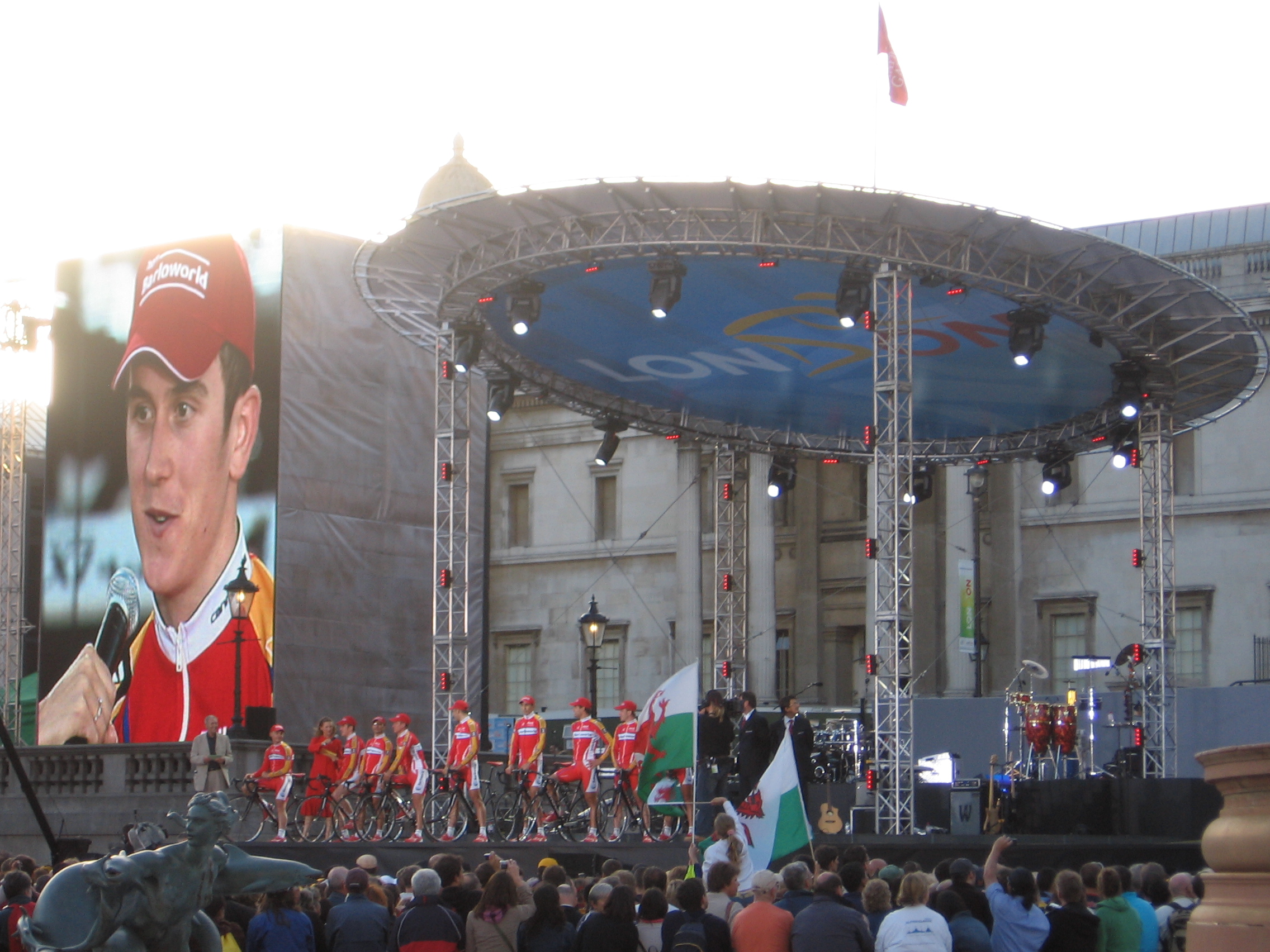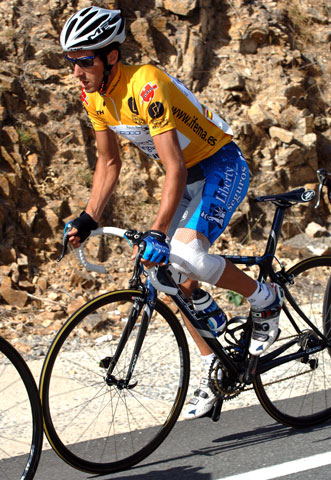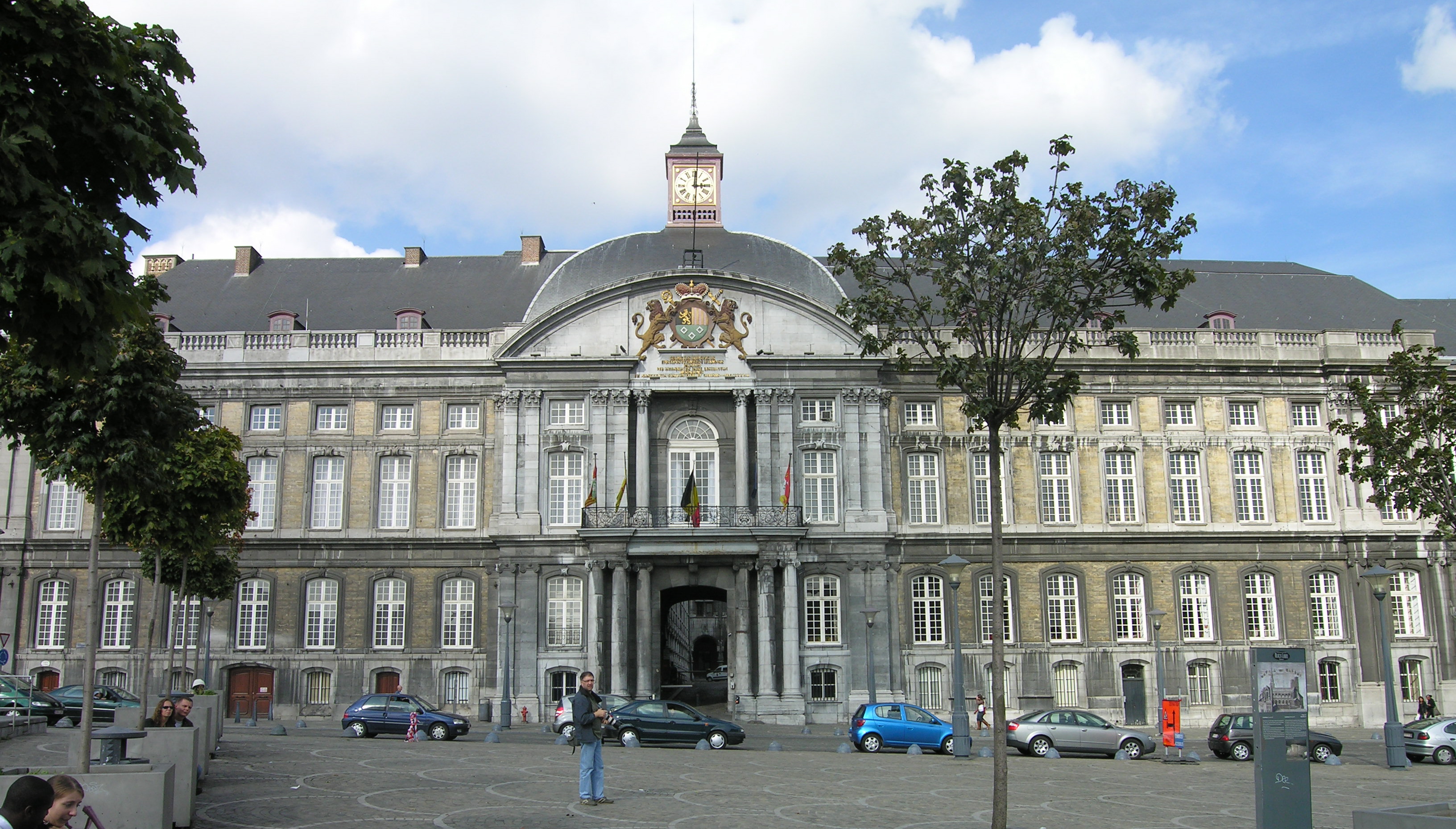|
Jorge Azanza
Jorge Azanza Soto (born 16 June 1982 in Alsasua, Navarre) is a Spanish professional road bicycle racer. He last competed for the UCI ProTour team . In 2004, Azanza won his first and still only races, when he finished first in the overall rankings of the Vuelta a Córdoba. He also won Part A of the third stage in the Bidasoa Itzulia in that same year. In 2007 he made his Tour de France debut. Career achievements Major results ;2004 :1st Overall Vuelta a Cordoba :1st Stage 3a Bidasoa Itzulia ;2005 :9th Overall Vuelta a La Rioja ;2006 :6th Trofeo Magaluf-Palmanova The Challenge Vuelta Ciclista a Mallorca ( en, Tour of Majorca, ca, Challenge Volta Ciclista a Mallorca) is a series of four (five until 2012) professional one day road bicycle races held on the Spanish island of Mallorca in late January or earl ... Grand Tour general classification results timeline References External links * 1982 births Living people Cyclists from Navarre People from Barran ... [...More Info...] [...Related Items...] OR: [Wikipedia] [Google] [Baidu] |
2007 Tour De France
The 2007 Tour de France the 94th running of the race, took place from 7 to 29 July. The Tour began with a prologue in London, and ended with the traditional finish in Paris. Along the way, the route also passed through Belgium and Spain. It was won by Spanish rider Alberto Contador. The Tour was marked by doping controversies, with three riders and two teams withdrawn during the race following positive doping tests, including pre-race favourite Alexander Vinokourov and his Astana team. Following Stage 16, the leader of the general classification, Michael Rasmussen, was removed from the Tour by his Rabobank team, who accused him of lying about the reasons for missing several drug tests earlier in the year. The points classification, indicated by the green jersey, was won for the first time by Tom Boonen, who had failed to complete the previous two Tours after leading the points classification at times during each. The mountains classification, indicated by the polkadot jersey ... [...More Info...] [...Related Items...] OR: [Wikipedia] [Google] [Baidu] |
2011 Giro D'Italia
The 2011 Giro d'Italia was the 94th Giro d'Italia, one of cycling's Grand Tours. The race started on 7 May with a team time trial in Turin to celebrate the 150th anniversary of Italian unification, when the city served as the first capital of the single state. The route was one of the most difficult in the modern history of the race, with substantial criticism that it was simply too hard for a three-week-long race. Of the seven stages categorized as 'high mountain', six had summit arrivals, highlighted by the three stages before the second rest day ending at Grossglockner in Austria, the exceptionally steep Monte Zoncolan, and a tall and steep peak near the Fascia Valley in Gardeccia. There was also, for the fifth consecutive Giro, a climbing time trial, this one to the Nevegal. Of the race's 18 mass-start stages, only three ended with the majority of the field together at the front of the race. In the third stage, rider Wouter Weylandt crashed coming down the Passo del Bocc ... [...More Info...] [...Related Items...] OR: [Wikipedia] [Google] [Baidu] |
Living People
Related categories * :Year of birth missing (living people) / :Year of birth unknown * :Date of birth missing (living people) / :Date of birth unknown * :Place of birth missing (living people) / :Place of birth unknown * :Year of death missing / :Year of death unknown * :Date of death missing / :Date of death unknown * :Place of death missing / :Place of death unknown * :Missing middle or first names See also * :Dead people * :Template:L, which generates this category or death years, and birth year and sort keys. : {{DEFAULTSORT:Living people 21st-century people People by status ... [...More Info...] [...Related Items...] OR: [Wikipedia] [Google] [Baidu] |
1982 Births
__NOTOC__ Year 198 (CXCVIII) was a common year starting on Sunday (link will display the full calendar) of the Julian calendar. At the time, it was known as the Year of the Consulship of Sergius and Gallus (or, less frequently, year 951 '' Ab urbe condita''). The denomination 198 for this year has been used since the early medieval period, when the Anno Domini calendar era became the prevalent method in Europe for naming years. Events By place Roman Empire *January 28 **Publius Septimius Geta, son of Septimius Severus, receives the title of Caesar. **Caracalla, son of Septimius Severus, is given the title of Augustus. China *Winter – Battle of Xiapi: The allied armies led by Cao Cao and Liu Bei defeat Lü Bu; afterward Cao Cao has him executed. By topic Religion * Marcus I succeeds Olympianus as Patriarch of Constantinople (until 211). Births * Lu Kai (or Jingfeng), Chinese official and general (d. 269) * Quan Cong, Chinese general and advisor ( ... [...More Info...] [...Related Items...] OR: [Wikipedia] [Google] [Baidu] |
Jorge Azanza Soto (Tour De France - Stage 7)
Jorge Azanza Soto (born 16 June 1982 in Alsasua, Navarre) is a Spanish professional road bicycle racer. He last competed for the UCI ProTour team . In 2004, Azanza won his first and still only races, when he finished first in the overall rankings of the Vuelta a Córdoba. He also won Part A of the third stage in the Bidasoa Itzulia in that same year. In 2007 he made his Tour de France debut. Career achievements Major results ;2004 :1st Overall Vuelta a Cordoba :1st Stage 3a Bidasoa Itzulia ;2005 :9th Overall Vuelta a La Rioja ;2006 :6th Trofeo Magaluf-Palmanova The Challenge Vuelta Ciclista a Mallorca ( en, Tour of Majorca, ca, Challenge Volta Ciclista a Mallorca) is a series of four (five until 2012) professional one day road bicycle races held on the Spanish island of Mallorca in late January or earl ... Grand Tour general classification results timeline References External links * 1982 births Living people Cyclists from Navarre People from Barran ... [...More Info...] [...Related Items...] OR: [Wikipedia] [Google] [Baidu] |
Did Not Finish
In racing, did not finish (DNF) denotes a result of a participant who does not finish a given race, either because of a mechanical failure, injury, or involvement in an accident. The term is used in: *Automotive racing such as Formula One; NASCAR; IndyCar; off-road racing, including buggy, trucks, kart, and UTVs, both desert and short-track *Motocross and quad racing, both desert and short-track *Horse racing *Competitive cycling *Competitive track and distance running *Competitive snow skiing and snowboarding *Speedcubing Race participants try to avoid receiving a DNF, as some associate it with poor driving. Scholarly research Decathlon competitors Numerous studies have sought to figure out why DNF rates vary greatly, even within the same competitive discipline. For example, in track and field, Edouard found a 22% overall DNF rate among high level decathlon competitors but DNF rates in individual events ranging from less than 1% to over 6%. DNFs are also not always even ... [...More Info...] [...Related Items...] OR: [Wikipedia] [Google] [Baidu] |
2013 Vuelta A España
The 2013 Vuelta a España was the 68th edition of the race. Chris Horner won the 2013 Vuelta at the age of 41 on 15 September 2013, becoming the oldest ever Grand Tour winner. Horner beat his nearest challenger, Italian Vincenzo Nibali, by finishing ahead of him in each of the final three mountainous stages before the final stage into Madrid. This Vuelta started in Galicia on August 24, 2013. The race spent 5 days in Galicia, then continued anticlockwise touring Spain through Castile and León, Extremadura, Andalusia, Aragon, Catalonia, La Rioja, Cantabria, and Asturias, before returning to Madrid for the finish on September 15. The Vuelta included excursions into two neighboring countries, Andorra and France. The top three stage winners received the following bonuses in the general classification: 10 seconds for winners of the stages, six seconds for runners-up, and four seconds for those in third place. Teams The 19 UCI World Tour teams were automatically entitled to start ... [...More Info...] [...Related Items...] OR: [Wikipedia] [Google] [Baidu] |
2011 Vuelta A España
The 2011 Vuelta a España was held from 20 August to 11 September. The bicycle race began in Benidorm with a team time trial and ended, as is traditional, in Madrid. The 2011 Vuelta was the 66th edition of the race and was the first Vuelta in 33 years that visited the Basque Country. The 33-year absence from the region was due to fear of political protests. Commentators claimed that it was a race well suited for climbers due to the short time trials and the large number of climbing kilometres. Nine of the twenty-one stages were ranked as Mountain stages, and six of them had a mountain-top finish (including the very steep uphill finish on the Alto de L'Angliru). Two other stages had steep uphill finishes, both of which were won by Katusha leader Joaquim Rodríguez. This Vuelta saw the introduction of a combativity award, much like that in the Tour de France. The most combative rider in each stage was awarded a red back number which he wore for the next stage. The victory was ... [...More Info...] [...Related Items...] OR: [Wikipedia] [Google] [Baidu] |
List Of Vuelta A España General Classification Winners
The Vuelta a España is an annual road bicycle race. Established in 1935 by the Spanish newspaper ''Informaciones'', the Vuelta is one of cycling's three "Grand Tours", along with the Tour de France and the Giro d'Italia. Initially, the race was held in April/May, but in 1995 it was moved to September. The race usually covers approximately 3,500 kilometres (2,200 mi), although this has varied, passing through Spain and countries with a close proximity in Europe. The race is broken into day-long segments called stages. Individual finishing times for each stage are totalled to determine the overall winner at the end of the race. The course changes every year, but has traditionally finished in Madrid. Individual times to finish each stage are totalled to determine the winner of the general classification at the end of the race. The rider with the lowest aggregate time at the end of each day wears the leader's jersey. Since 2010 this has been a red jersey; previously it was gold. ... [...More Info...] [...Related Items...] OR: [Wikipedia] [Google] [Baidu] |
Jersey Red
Jersey ( , ; nrf, Jèrri, label= Jèrriais ), officially the Bailiwick of Jersey (french: Bailliage de Jersey, links=no; Jèrriais: ), is an island country and self-governing Crown Dependency near the coast of north-west France. It is the largest of the Channel Islands and is from the Cotentin Peninsula in Normandy. The Bailiwick consists of the main island of Jersey and some surrounding uninhabited islands and rocks including Les Dirouilles, Les Écréhous, Les Minquiers, and Les Pierres de Lecq. Jersey was part of the Duchy of Normandy, whose dukes became kings of England from 1066. After Normandy was lost by the kings of England in the 13th century, and the ducal title surrendered to France, Jersey remained loyal to the English Crown, though it never became part of the Kingdom of England. Jersey is a self-governing parliamentary democracy under a constitutional monarchy, with its own financial, legal and judicial systems, and the power of self-determination. The isl ... [...More Info...] [...Related Items...] OR: [Wikipedia] [Google] [Baidu] |
2012 Tour De France
The 2012 Tour de France was the 99th edition of the Tour de France, one of cycling's Grand Tours. It started in the Belgian city of Liège on 30 June and finished on the Champs-Élysées in Paris on 22 July. The Tour consisted of 21 stages, including an opening prologue, and covered a total distance of . As well as the prologue, the first two stages took place in Belgium, and one stage finished in Switzerland. Bradley Wiggins () won the overall general classification, and became the first British rider to win the Tour. Wiggins's teammate Chris Froome placed second, and Vincenzo Nibali () was third. The general classification leader's yellow jersey was worn for the first week by Fabian Cancellara (), who won the prologue. Wiggins, second in the prologue, took the leadership of the race on stage seven, the first mountainous stage, which was won by Froome, and maintained his lead for the remainder of the race, winning the two longest time trials, and not losing time to his main cha ... [...More Info...] [...Related Items...] OR: [Wikipedia] [Google] [Baidu] |
General Classification In The Tour De France
The general classification is the most important classification, the one by which the winner of the Tour de France is determined. Since 1919, the leader of the general classification wears the yellow jersey (french: maillot jaune ). History The winner of the first Tour de France wore a green armband, not a yellow jersey. After the second Tour de France, the rules were changed, and the general classification was no longer calculated by time, but by points. This points system was kept until 1912, after which it changed back into the time classification. At that time, the leader still did not wear a yellow jersey. There is doubt over when the yellow jersey began. The Belgian rider Philippe Thys, who won the Tour in 1913, 1914 and 1920, recalled in the Belgian magazine ''Champions et Vedettes'' when he was 67 that he was awarded a yellow jersey in 1913 when the organiser, Henri Desgrange, asked him to wear a coloured jersey. Thys declined, saying making himself more visible in y ... [...More Info...] [...Related Items...] OR: [Wikipedia] [Google] [Baidu] |





.jpg)